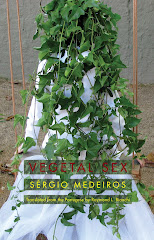 In my most recent post on the Irascible Poet I miss spoke- i said that Ron Silliman lives in the non-poetry world- and he corrected me that he lives in the non academic world.
In my most recent post on the Irascible Poet I miss spoke- i said that Ron Silliman lives in the non-poetry world- and he corrected me that he lives in the non academic world. This prompted me to think about the reason that we all read Ron's blog. Ron Silliman and his blog is a phenomenon in poetry. He mentioned a post once here on the Irascible poet and within five hours I had 4000 visits so of course Ron's work has influence.
But why?
There are two reasons I think that Silliman's Blog does well. Ron's blog is in many ways an echo of older ways of doing poetry.
Most of our poets and poetries today are created in academia. This creates in many poets a hot house effect. There is little real risk involved in the work it is written to satisfy an academic discussion rather than an artistic one. Few poets make their living writing poetry. This makes for a narrow discussion in the poetic marketplace.
In the past however poets and poetry were in dialogue with art and artists in general. All one has to do is remember that at the Cedar bar in New York in the 1950's Pollock and Creeley were sitting at the same tables. Frank O' Hara was an art critic, there were many others. This sense that poets were part of a larger artistic movement was important and is lost as most poets specialize to fit into the world as it exists today. We dont see many collaborations anymore film and visual art are not in dialogue with poetry as was the case in the past.
On Silliman's blog this type of dialogue continues. It is interesting because on most blogs you get bits and pieces. Poets put up their own poetry or their own readings but on Ron's blog we get film and art reviews. We get commentary about a very large range of subjects, including Baseball which is appreciated. There are of course criticisms of this blog. Ron tends to favor certain types of poets and his asthetic is not always the most interesting but at least there is the kind of cross pollination that is lacking in other venues.
I think the reason for the success of the Blog is that it is not specialized. I exist as Ron does in two worlds- one poetic and one in business (the publishing events business in my case)- this changes the way one views both worlds since they are so different. But in some ways not being an academic frees one to partake in other artforms and to absorb more of the world without the need to exist in academia for one's bread. This freedom lets Ron be more critical and more open that would normally be possible. I find that this lack of control on his part makes the blog work. I also think that the lack of poet speak makes a difference.
I was told once that the difference between Olson, Duncan, and O'Hara and today's poets is that they were public intellectuals. This, I think is the issue at hand. Most poets today are specialists they do one thing well and they understand how to function in a specific environment. That was not true about Olson or Duncan or O'Hara and it is not true about Silliman's Blog.
My questions about Language Poetry and Flarf and other movements are basically focused on the idea of the public intellectual and this dialogue. I wonder if these movements are simply an easy retreat into the academic bosom as not to be challenged by larger forces? Perhaps that is the critique? Do we retreat into our own epistemological system or do we engage with the world as poets?
Is what we are doing small or is it big? Do we exist among other artists? Or do we exist within the academy?








